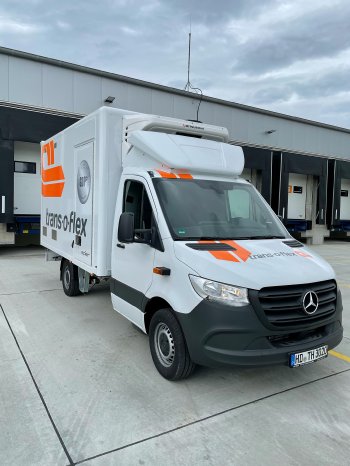- Quieter, more environmentally friendly and more economical in operation: trans-o-flex subsidiary launches one-year practical test to see whether electric cooling systems keep their sustainability promises
- Back-up battery allows the engine to be switched off during longer stops and increases fail-safety
Conventional refrigeration units in vans obtain the necessary energy exclusively from the vehicle's diesel engine. "When the vehicle stops for delivery, the engine may have to keep running to ensure that the temperature is maintained," explains Albeck. "This leads not only to higher fuel consumption but also to higher noise pollution."
Both of these can now be avoided with new units that run on electricity. During the journey, energy is supplied by a generator powered by the engine. As soon as the engine is off, a back-up battery provides the necessary power. The vehicle engine is also not needed for the necessary advance regulation of the load compartment to the correct temperature. For this purpose, the vehicle can be connected to a conventional 230-volt socket, which is also used to charge the back-up battery. In the event of engine failure, the battery can keep the vehicles at the right temperature for several hours. And since many vehicles are used in hospital areas, lower noise levels due to the battery-powered cooling system are also a positive factor there.
According to Albeck, the Mitsubishi TE 30 units are about 3,000 euros more expensive to buy than the cooling units previously used at ThermoMed. In addition, the system (including battery) weighs 192 kilos, almost 40 kilos more than a comparable conventional system. "The bottom line costs could still be lower because the fuel consumption of the carrier vehicle is reduced and the maintenance and repair costs of the electrical system should be lower," says Albeck. "But we are going to check all that out more closely now."
The test phase began in April. The electric refrigeration units are being tested in conjunction with three latest-generation Mercedes Sprinters and a thermal box from the body manufacturer Spier. The cooling unit is suitable for vehicles with different temperature zones. Albeck: "We will also be checking that and using the vehicles in the pure cooling range between 2 to 8 degrees, in the so-called room temperature range of 15 to 25 degrees as well as in mixed operation with two temperature zones."


